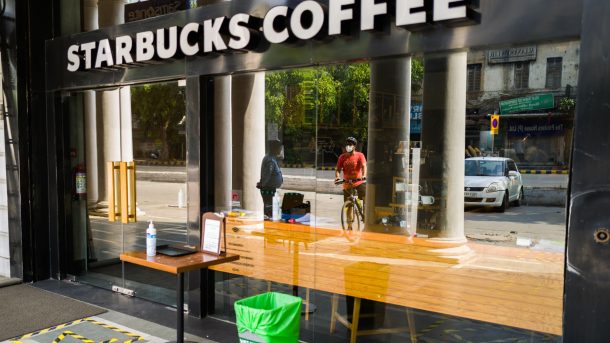
Starbucks India is facing boycott calls amid accusations of “going full Bud Light” with the recent unveiling of a new commercial featuring supportive parents meeting at one of its locations with their transgender daughter.
Over the past several weeks, Bud Light has been the focus of a divisive debate after sending transgender influencer Dylan Mulvaney a personalized beer can in early April to commemorate 365 days of being a woman. Mulvaney’s Days of Girlhood video series, which charts her first year of transitioning, has been a viral success.
The partnership drew condemnation from a number of right-leaning social media users, who issued calls for a boycott. There have since been reports of plummeting Bud Light sales.
Starbucks India is now facing a similar backlash due to an ad shared on the company’s Twitter account. The clip showed a mother and father meeting with their adult transgender daughter at a Starbucks store. The father had not seen his daughter since her transition.
While the father was depicted as struggling with his daughter’s transition, he got up to order beverages. The clip ended with the barista announcing that the drink order was ready for “Arpita,” the female equivalent of their child’s pre-transition name, indicating that he was accepting his daughter for who she is.
“For me, you are still my kid. Only a letter has been added to your name,” he said, reaching out to clasp his smiling daughter’s hand.
“Your name defines who you are—whether it’s Arpit or Arpita,” read Starbucks India’s caption. “At Starbucks, we love and accept you for who you are. Because being yourself means everything to us. #ItStartsWithYourName.”
The video was met with a strong reaction on Twitter.
“Starbucks facing a backlash in India after going full Bud Light,” tweeted Australia-based political commentator Rukshan Fernando. “If saturating the market with a mediocre US coffee brand wasn’t bad enough, now they are bringing their woke corporate culture to the Sub-Continent.”
Another Twitter user suggested that such a commercial would never have been considered by Starbucks in certain areas of the world.
“Western capitalism will only export these ideas where they are receptive,” they wrote. “Starbucks in Saudi, UAE and Qatar have been around for much longer than India. Yet you will never see them place such ads there.”
“Alright India here’s your chance to resist properly,” said Indian internet personality Nuance Bro. “Let’s see if [Indian Prime Minister Narendra] Modi is truly the right wing dictator the West claims he is. Don’t let this programming gain a foothold.”
Another Twitter user commented that they would “never again” visit Starbucks, adding: “You will bring such adverts to India but you wouldn’t dare talk like this in Middle East would you? Am going to show this to my colleagues and friends and then let’s see how they treat @StarbucksUAE.”
Others expressed objection to the transgender woman depicted in the commercial having a Hindu name, insisting that Muslims and people of other religions and identities would not have been portrayed in the same way.
Responding to Starbucks India’s caption of one’s name defining “who you are,” author Shefali Vaidya wrote: “No @StarbucksIndia, it does NOT start with the name. If it did, you would have showed an ad where Asif becomes Asifa or John turning into a Jane. But you don’t have the guts to do that, because your ad guys want their head attached to their neck! So you give [knowledge] only to Hindus!”
Another encouraged others to shy away from the U.S.-founded brand and buy locally.
“Instead of going to @StarbucksIndia and having a woke doused cappuccino, go to the local hotel and have a good filter coffee,” they tweeted. “Encourage local. It tastes much much better and goes well on your pocket too!”
Amid the condemnation, a number of Twitter users expressed support for the ad being released in India, where the nation’s first transgender mayor was elected in the state of Chhattisgarh in January 2015, nine months after a court ruled that transgender be recognized as a legal third gender.
“My best friend showed me this @StarbucksIndia advert yesterday and it reduced me to tears,” tweeted LGBTQ rights activist Asad Zafar. “It’s groundbreaking adverts like this which are SO important when it comes to changing attitudes around queer folk, especially in a world where transphobia is becoming even more rampant.”
“#BoycottStarbucks why?” asked one supporter on Twitter. It’s unfortunate that some people are choosing to boycott @StarbucksIndia just because they released an advertisement featuring a transgender person. In my opinion, the ad was well-made and didn’t contain any flaws. @Starbucks may not need you either.”
“I cannot imagine being estranged from my children for any reason let alone for them being who they are, but I know not everyone is there yet,” another person wrote. “This advert for Starbucks from India, still an incredibly conservative country, sends a powerful statement.”
“It’s kinda sad that people are so narrow minded, thinking this is some horrible ‘woke ideology’, trans people exist around the world,” said a Twitter user.
Starbucks entered the Indian market in 2012 through a 50/50 joint venture with Tata Consumer Products. According to The Drum, it now has 341 stores across 43 cities in the country.
The outlet quotes Deepa Krishnan, chief marketing officer of Tata Starbucks as saying of its new campaign: “The unique Starbucks experience where everyone feels welcome is what drives our growth. With the #ItStartsWithYourName campaign, we hope to further drive the message of being a welcoming, inclusive brand where nothing matters to us more than our customers’ comfort.”
Starbucks is one of a number of U.S. chains in India, including McDonald’s, Taco Bell, KFC and Burger King.